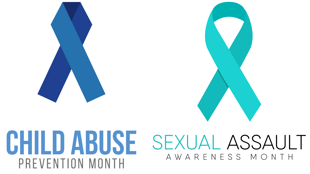 April is both Sexual Assault and Child Abuse Awareness month. We want to join the voices in bringing awareness to these issues as they are close to our hearts.
April is both Sexual Assault and Child Abuse Awareness month. We want to join the voices in bringing awareness to these issues as they are close to our hearts.
There is a chance that in your journey as a foster parent, you may be placed with a child who has been sexually assaulted or abused.
According to RAINN (Rape, Abuse & Incest National Network), 1 in 9 girls and 1 in 53 boys under the age of 18 experience sexual abuse or assault.
It would be convenient to say there are clear cut rules for how to parent a child who has been sexually abused, however, that would be inaccurate. Working closely with your support team, keeping the following tips in mind and educating yourself are the best things you can do to parent a foster child who has been sexually abused.
Responding to Disclosure
There is a chance you may be the first person to learn of your child’s sexual abuse. Foster parents provide a safe and stable home for a child. As your foster child grows in relationship and trust with you, they may feel comfortable enough tell you about their abuse.
Your response can make a very important impact in their ability to heal and move forward. Some helpful phrases may be:
- I believe you.
- It’s not your fault.
- You are not alone.
- You didn’t do anything to deserve this.
- Thank you for telling me this.
- I am always here for you.
Affirm that the abuse was not their fault. They’ll likely feel guilt and shame about the abuse. So, stay calm, let them know you care, and then contact us so we can connect them with services to best help them.
Be Aware of Behaviors
A counselor or therapist can help your foster child explore and process their emotions. Your role as a foster parent is to provide a safe home and structure for them to heal, recover, and just be a kid.
It is important to be balanced in your response to behaviors that stem from their abuse. Over-reacting gives the behavior too much power, under responding can communicate a lack of care.
A child who has been sexually abused can misbehave fearfully, aggressively, or sexually. Each type of behavior has an appropriate and helpful response.
A general overview would be, if a child is showing fearful behaviors, you should accept their fears as real and not try to force them to “get over” or punish them for their fears.
If they are exhibiting aggressive behaviors and acting out of anger you should find healthy outlets for them to release it. If they are showing sexual behaviors, you should enforce appropriate boundaries and reaffirm that abuse was not their fault.
Be Aware of Triggers
There are some things you can do to ensure your home is one that is safe and respectful of individual boundaries.
By following these guidelines, you are creating a space that is less likely to trigger a child with heightened sensitivity to certain situations.
- Make sure personal physical boundaries are respected and know each other’s boundaries. If someone doesn’t like hugs, they shouldn’t be forced to hug.
- If there is any play fighting or tickling, be cautious and sensitive that the act may bring up memories of abuse.
- Have a culture of privacy. Knock on doors before entering and encourage children to be independent in bathing and dressing.
- Limit sexualized media in the home. We know this is a tough one these days but do your best.
- Keep adult sexuality private. Keep clear limits to what is allowed when romantic partners are in the household. This is especially relevant to teens.
Education
Learn the appropriate behaviors your foster child should be displaying depending on their age. There are levels of sexual exploration at each stage of development in children. Meaning based on the age bracket, there are behaviors children should and should not be displaying.
For example, a preschool age child may have sexual language related to private areas and bathroom talk. However, they shouldn’t be able to discuss sexual acts.
ChildWelfare.gov is an excellent resource for parents of foster children and adoptive children who have been sexually assaulted and they have free downloads on their site. RAINN is another great resource for education on sexual abuse in the USA.
Whether you are placed with a child who is a survivor of sexual abuse or you find out your child has been sexually abused, we know you will be a safe harbor in their life and a great place to help them on their journey of healing.
You can always call your social worker if you need help. They are here as a resource while you are a resource for these children.
If being a foster parent is something you are interested in or even just curious about, we encourage you to contact your local foster agency to learn more.
